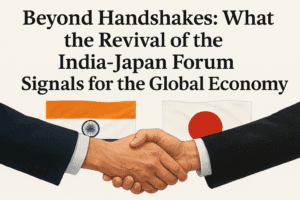Beyond Handshakes: What the Revival of the India-Japan Forum Signals for the Global Economy
After a seven-year hiatus, the India-Japan Business Leaders’ Forum reconvened with significant strategic purpose, co-chaired by Bharat Forge’s Baba Kalyani and attended by both nations’ prime ministers. The meeting transcended diplomatic formality, targeting a concrete alliance built on economic resilience and secure global supply chains. Key sectors for collaboration were pinpointed, including green energy, electric mobility, and semiconductors, leveraging Japanese technological prowess alongside India’s manufacturing scale and market potential.
This partnership is strategically positioned to de-risk global trade dependencies and foster co-development in critical future technologies like AI and space. The revived dialogue signals a serious shift from past promises towards actionable, high-value cooperation. Ultimately, it aims to create a powerful economic counterweight, enhancing job creation, technology access, and long-term stability for both nations and the region.

Beyond Handshakes: What the Revival of the India-Japan Forum Signals for the Global Economy
In a significant move that underscores a renewed commitment to one of Asia’s most critical economic partnerships, the India-Japan Business Leaders’ Forum convened this week after a seven-year hiatus. The presence of Prime Ministers Narendra Modi and Shigeru Ishiba was more than ceremonial; it was a powerful symbol of intent. Co-chaired by Baba Kalyani, the stalwart Chairman of Bharat Forge, the forum moved beyond pleasantries to lay down a concrete roadmap for a 21st-century alliance.
For observers of global economics, the revival of this dialogue is a telling development. It speaks to a shared urgency between the two nations to build a more resilient, diversified, and secure economic future, especially amid global trade uncertainties and shifting supply chains.
The Strategic Architect: Why Baba Kalyani’s Role Matters
The choice of Baba Kalyani as co-chair is itself a message. Bharat Forge, under his leadership, has evolved from a premier automotive component maker into a multinational defence and aerospace powerhouse. This journey mirrors India’s own ambition: to transition from a manufacturing hub to a creator of high-value, technologically advanced goods.
Kalyani’s address cut to the core of the partnership’s potential. He didn’t just speak of collaboration; he framed it as a “resilient and vital force for global economic security.” This phrasing is crucial. It positions the India-Japan relationship not as a mere bilateral trade agreement, but as a stabilizing pillar in an unstable world. His emphasis on building resilience in global value chains is a direct response to the vulnerabilities exposed by recent global events, suggesting a strategic “China Plus One” approach is now being operationalized at the highest levels.
The New Blueprint for Collaboration: From Green Steel to AI
The forum identified key sectors for cooperation, but the real insight lies in how these areas complement each nation’s strengths:
- Green Energy & Electric Mobility (EV): This is a natural synergy. Japan possesses cutting-edge battery technology and automotive prowess (e.g., Toyota, Suzuki, Honda). India offers a massive, scalable market and ambitious green hydrogen and electrification goals. The collaboration isn’t just about selling cars; it’s about co-developing supply chains for batteries, fuel cells, and the infrastructure that will support them.
- Semiconductors & Electronics: Japan is a leader in semiconductor materials and specialized equipment. India is making a multi-billion-dollar push through its ISM (India Semiconductor Mission) to become a chip-making nation. This isn’t competition; it’s complementarity. Japanese expertise can de-risk and accelerate India’s entry into this strategic sector.
- Space Technology & AI: Here, the partnership moves from economic to strategic. Japan’s advanced technological capabilities in robotics and precision engineering, combined with India’s cost-effective launch capabilities and software prowess, can create a formidable alliance for space exploration and security. Joint development in AI ethics and applications could set global standards.
- Digital Technology & Data Centres: As India’s digital economy explodes, the demand for secure, scalable data centre infrastructure is immense. Japanese firms bring the investment, cold-chain technology for cooling, and a disciplined approach to large-scale project management that this build-out requires.
The Human and Economic Value: Why This Matters to Everyone
This isn’t just news for business leaders. This partnership has tangible implications:
- Job Creation: Advanced manufacturing in semiconductors, electronics, and EVs will require a skilled workforce, spurring investments in vocational training and engineering education.
- Technology Access: Japanese investment often brings a long-term perspective and a commitment to quality and skill development, leading to better, more reliable products and services for consumers.
- Global Stability: A stronger India-Japan axis creates a more multipolar and balanced Asia, reducing over-reliance on any single nation for critical goods and enhancing collective economic security.
The Road Ahead
The seven-year gap between forums highlights that past commitments haven’t always been met with action. The true test will be in the execution. Can bureaucratic hurdles be overcome? Can Japanese patience with long decision-making cycles pair effectively with India’s dynamic but sometimes chaotic growth?
The difference this time is context. The global mood has shifted towards friend-shoring and trusted partnerships. The presence of both nations’ leaders, coupled with pragmatic industrialists like Kalyani, suggests a seriousness of purpose that may have been lacking before.
The message from this forum is clear: The India-Japan partnership has moved from a dialogue of potential to a strategic imperative. It’s a deliberate, calculated effort to co-build the industrial and technological ecosystems that will define the next decade, making their economies not just interconnected, but interdependent and resilient.
You must be logged in to post a comment.